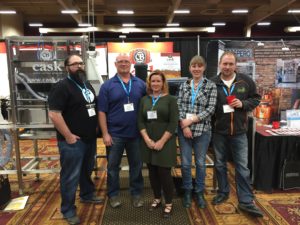 Every brewery in Alberta likes to brag that the province grows some of the best malting barley in the world. For good reason, because it is true. But most breweries are simply the lucky recipients of the farmers’ (and maltsters’) hard work.
Every brewery in Alberta likes to brag that the province grows some of the best malting barley in the world. For good reason, because it is true. But most breweries are simply the lucky recipients of the farmers’ (and maltsters’) hard work.
Not so, Siding 14 Brewing Company. They plan on doing it all, from beginning to end.
Siding 14 is opening soon to join Alberta’s burgeoning craft beer scene. They hope to open their doors in the central Alberta town of Ponoka (about 60 minutes south of Edmonton) sometime in June. What makes them unique is their commitment to grow and process everything they use in the beer. The barley, the hops and even the water (sorta – I’ll explain below). I had a chat recently with co-owner Marc Shields who explained the project.
“The vision is plow to pint”, says Shields. “Our goal is that every brew will be sourced from all our own ingredients”. This doesn’t appear to be idle marketing talk. The other partners in the brewery are Kari and Brent Tarasoff (Shields’ sister and brother-in-law), who operate Square One Hop Growers in Penticton, and Josh and Femke Lubach, who operate Pridelands Grain barley farm north of Ponoka. Their role is to provide the raw ingredients that go into the beer.
Shields, who has been a homebrewer for six years, will handle the brewing side of the business. He currently lives in Airdrie and works as a manager in the retail sector.
“My sister and I have been talking for years about getting into this business,” says Shields. “Brent works in farming consulting and through his connections we got hooked up with Josh. We talked up the concept with him a few times. Last time we talked he said let’s go”.
And go they did. That was October 2016. Things moved fast from there. Construction on the brewery, on the south end of Ponoka, began in December. The brewhouse is expected in the coming weeks and Shields says they “would love to have beer available for the [Ponoka] Stampede on Canada Day”. The pace was helped by the fact Lubach owned the parcel of land where the brewery is located and the town did not put up any hurdles to its approval.
The brewery will be 15-barrel (BBL) in capacity and they will start with two 15-BBL and three 30-BBL fermenters, along with two conditioning tanks. “There is physical space to triple our capacity”. They will be packaging in 355-ml cans with seasonals in bombers and the usual growler fills. They are building a 50-seat tap room with a 15-seat patio. “The tap room is about coming in, having a pint, having conversation, about bringing people together”.
Shields acknowledges that due to timing, they won’t be launching with their own barley (which will still be in the ground). But that is a stop-gap until the harvest. As for malting, Siding 14 plans to contract to nearby Red Shed Malting and the other emerging craft malt houses in the province to “custom malt” for them. In fact, Shields sees that as an opportunity. Working with small batches at different maltsters “gives us a chance to profile each maltster’s flavour and to create unique malt profiles”. Their hop farm has 17 different varieties and within a couple years should also be able to supply 100% of the brewery’s hop needs.
As for the water, Shields says that unlike most breweries, who tweak and filter existing city water, they plan on putting water through reverse osmosis and building the water profile for each batch “from scratch”.
For city slickers (like me) the name might be perplexing. But for area residents, it is instantly recognized. “Alberta and western Canada were settled through railroad”, notes Shields. “The main railroad line ran from Calgary to Edmonton. Along line were a series of sidings, which is an area with two lines of track so one train can pull over wait for another to go by. These sidings are where communities started growing”. Each siding was numbered. The site where Ponoka now sits was Siding 14. Hence the name.
As for the beer, Shields says they are conscious of their location. “Ponoka is not known for craft beer, so we needed to create a flavour profile for both customers new to craft and for the beer geek willing to drive that far to try our beer. Our jobs is to bridge and to educate – moving someone buying macro beer to something more fun for them as palate is concerned. Be we also want to create something that it is worth coming out to see us from Edmonton or Calgary”.
They are starting with six core beer, which they call their “mainline taps”. They include Dayliner Golden Ale, Switch Point Cream Ale, Pullman Pale Ale, Ten-Wheeler IPA, Brakeman Brown Ale and Coal Pusher Stout. They have six taps available at the brewery for rotating products (what they call “roundhouse taps”), which Shields sees as the beer aimed more at beer geeks. The seasonals are still in development, but he hopes to play around with it. “For example, I am toying with a sarsaparilla brown ale”.
You may have noticed a railway theme with Siding 14. That is intentional. “We see the railway as a natural connection to Alberta and how it created connection between small communities. It was the only way people were getting back and forth between communities”. They want the rail theme to carry through all levels of the brewery. “We want continuity, our names, the tasting room, our products”.
Like many new breweries, Siding 14’s first priority will be serving the local community and establishing a base. But their plan is a wider distribution across Alberta. “We want to be in all major centres. We will self-distribute at first but will go through Connect [Logistics] when we feel we are ready”.
If Siding 14 pulls off their goal of growing all of their ingredients, it will be a truly unique brewery experience in western Canada. I look forward to watching it happen.



April 26, 2017 at 1:58 PM
Can’t wait. This will be the closest brewery to my door… If the beer is good, I will be there often. Not gonna lie though,it’s gonna have to be pretty stellar for me to not keep driving the extra 20 min to Blindman.
April 27, 2017 at 4:52 PM
The beer will be good and the best case scenario would be to bring back the steam train which built this country. We should have a nostalgic line between Edmonton and Calgary with stops at all the smaller communities that built this province. Forget the bullet train. Take a cab Kurt and don’t drive OK. Thanks
April 27, 2017 at 5:11 PM
Take a cab? Lol. As much as I want to spend $150 in cab fare to check out a new release or sample a couple beers… not gonna happen. Closest brewery to me is 75km away. Moderation and responsibility are my only option.
April 27, 2017 at 5:18 PM
Got it and go Edmonton Flames go. LOL.